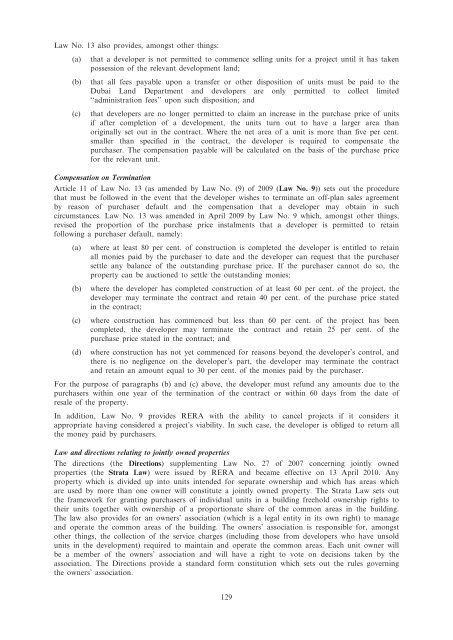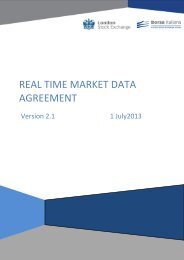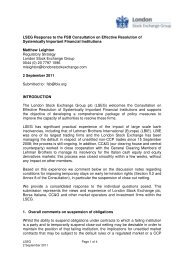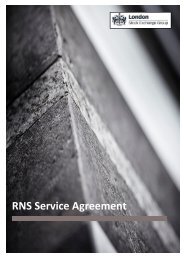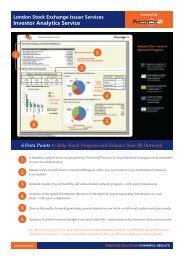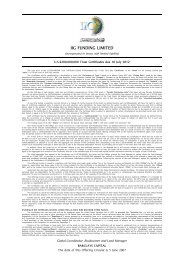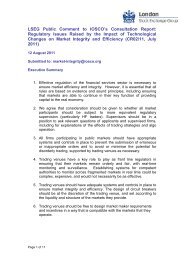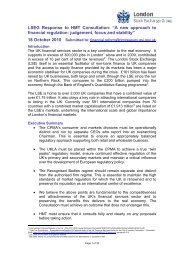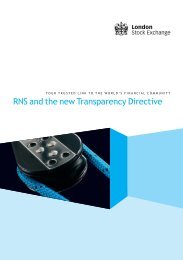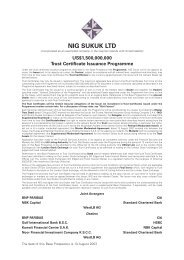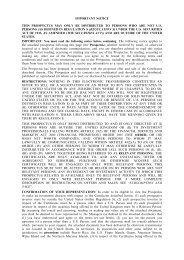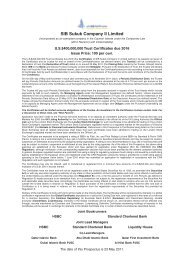Emaar Sukuk Ltd XS0586840588 - London Stock Exchange
Emaar Sukuk Ltd XS0586840588 - London Stock Exchange
Emaar Sukuk Ltd XS0586840588 - London Stock Exchange
Create successful ePaper yourself
Turn your PDF publications into a flip-book with our unique Google optimized e-Paper software.
c103695pu050 Proof 7: 17.1.11 B/L Revision:Law No. 13 also provides, amongst other things:(a)(b)(c)that a developer is not permitted to commence selling units for a project until it has takenpossession of the relevant development land;that all fees payable upon a transfer or other disposition of units must be paid to theDubai Land Department and developers are only permitted to collect limited‘‘administration fees’’ upon such disposition; andthat developers are no longer permitted to claim an increase in the purchase price of unitsif after completion of a development, the units turn out to have a larger area thanoriginally set out in the contract. Where the net area of a unit is more than five per cent.smaller than specified in the contract, the developer is required to compensate thepurchaser. The compensation payable will be calculated on the basis of the purchase pricefor the relevant unit.Compensation on TerminationArticle 11 of Law No. 13 (as amended by Law No. (9) of 2009 (Law No. 9)) sets out the procedurethat must be followed in the event that the developer wishes to terminate an off-plan sales agreementby reason of purchaser default and the compensation that a developer may obtain in suchcircumstances. Law No. 13 was amended in April 2009 by Law No. 9 which, amongst other things,revised the proportion of the purchase price instalments that a developer is permitted to retainfollowing a purchaser default, namely:(a)(b)(c)(d)where at least 80 per cent. of construction is completed the developer is entitled to retainall monies paid by the purchaser to date and the developer can request that the purchasersettle any balance of the outstanding purchase price. If the purchaser cannot do so, theproperty can be auctioned to settle the outstanding monies;where the developer has completed construction of at least 60 per cent. of the project, thedeveloper may terminate the contract and retain 40 per cent. of the purchase price statedin the contract;where construction has commenced but less than 60 per cent. of the project has beencompleted, the developer may terminate the contract and retain 25 per cent. of thepurchase price stated in the contract; andwhere construction has not yet commenced for reasons beyond the developer’s control, andthere is no negligence on the developer’s part, the developer may terminate the contractand retain an amount equal to 30 per cent. of the monies paid by the purchaser.For the purpose of paragraphs (b) and (c) above, the developer must refund any amounts due to thepurchasers within one year of the termination of the contract or within 60 days from the date ofresale of the property.In addition, Law No. 9 provides RERA with the ability to cancel projects if it considers itappropriate having considered a project’s viability. In such case, the developer is obliged to return allthe money paid by purchasers.Law and directions relating to jointly owned propertiesThe directions (the Directions) supplementing Law No. 27 of 2007 concerning jointly ownedproperties (the Strata Law) were issued by RERA and became effective on 13 April 2010. Anyproperty which is divided up into units intended for separate ownership and which has areas whichare used by more than one owner will constitute a jointly owned property. The Strata Law sets outthe framework for granting purchasers of individual units in a building freehold ownership rights totheir units together with ownership of a proportionate share of the common areas in the building.The law also provides for an owners’ association (which is a legal entity in its own right) to manageand operate the common areas of the building. The owners’ association is responsible for, amongstother things, the collection of the service charges (including those from developers who have unsoldunits in the development) required to maintain and operate the common areas. Each unit owner willbe a member of the owners’ association and will have a right to vote on decisions taken by theassociation. The Directions provide a standard form constitution which sets out the rules governingthe owners’ association.129


